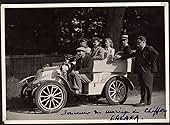"Chiffon" is an eccentric young aristocratic girl, who is struggling to comply with the social conventions of the community."Chiffon" is an eccentric young aristocratic girl, who is struggling to comply with the social conventions of the community."Chiffon" is an eccentric young aristocratic girl, who is struggling to comply with the social conventions of the community.
Photos
Louis Seigner
- Philippe de Bray
- (as Louis Seignier)
Richard Francoeur
- Léon
- (as Francoeur)
Storyline
Did you know
- ConnectionsVersion of Le mariage de Chiffon (1918)
Featured review
It's about 1904 in the middle of France. Lt. Colonel André Luguet has just been posted back to his old haunts on a rainy night. Walking to his hotel, he encounters Odette Joyeux, a 28-year-old woman playing a girl half her age splashing barefoot in a puddle and is enchanted. One by one, we are introduced to Odette's family: her mother, Suzanne Dantès. Her stepfather, Louis Seigner; her doting bachelor uncle-by-marriage, Jacques Demesnil, who is trying to build an airplane; and so forth. It's a sweet little romance that bounces back and forth, making fun of a France gone forty years.
It was the sort of movie approved by the authorities at the time: light, fluffy and not the sort of thing to make anyone think any deep thoughts. Director Claude Autunt-Laura was the Anti-Clouzot of directors. Clouzot showed you the seamy side of things. Autant-Lara showed you the rich drinking orangeade. Clouzot made one film during the War, LE CORBEAU, which got him banned because it annoyed the Vichy Government. Then, after the War, it still annoyed the new government, so he couldn't make another film for a few years. Meanwhile Autant-Lara made films before the War, during the War and after the War and no one seemed to notice, because they were pleasant, frothy things when that was the style. Just the amount of sex in them changed according to the current fashion.
It's a well-told story, even if Mlle. Joyeux is a bit old for her role. I'm sure the audience was pleased to think back to 1904, when La Belle France was forward-thinking and, in the words of a character here, discussing his martial defeat, "We always think we will win." I'm sure that modest, self-denigrating remark was approved by the censors, who could never approve of Clouzot, no matter whose government they represented.
It was the sort of movie approved by the authorities at the time: light, fluffy and not the sort of thing to make anyone think any deep thoughts. Director Claude Autunt-Laura was the Anti-Clouzot of directors. Clouzot showed you the seamy side of things. Autant-Lara showed you the rich drinking orangeade. Clouzot made one film during the War, LE CORBEAU, which got him banned because it annoyed the Vichy Government. Then, after the War, it still annoyed the new government, so he couldn't make another film for a few years. Meanwhile Autant-Lara made films before the War, during the War and after the War and no one seemed to notice, because they were pleasant, frothy things when that was the style. Just the amount of sex in them changed according to the current fashion.
It's a well-told story, even if Mlle. Joyeux is a bit old for her role. I'm sure the audience was pleased to think back to 1904, when La Belle France was forward-thinking and, in the words of a character here, discussing his martial defeat, "We always think we will win." I'm sure that modest, self-denigrating remark was approved by the censors, who could never approve of Clouzot, no matter whose government they represented.
Details
- Release date
- Country of origin
- Language
- Also known as
- Uzavrela ljubav
- See more company credits at IMDbPro
- Runtime1 hour 43 minutes
- Color
- Sound mix
- Aspect ratio
- 1.37 : 1
Contribute to this page
Suggest an edit or add missing content

Top Gap
By what name was Le mariage de Chiffon (1942) officially released in Canada in English?
Answer























